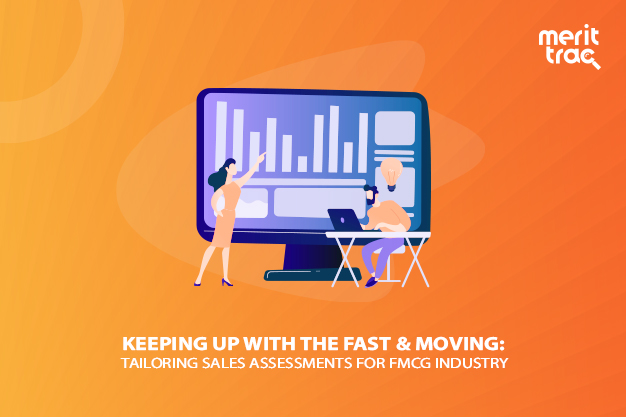
Keeping up with the Fast-&-Moving:Tailoring Sales Assessments for FMCG Industry
Date: 02/04/2020 | Posted by: Meghana Jitendra, Psychometrician | Category: Corporate
When asked to imagine a salesperson, you picture a person selling goods or services to a customer, be it on the phone or in a showroom or at your doorstep. While that is not a wrong idea of a salesperson, not all of sales is ‘primary sales’; not all salespersons directly sell to the customer. This is clearly seen in the FMCG industry, where ‘sales’ is actually a network of sales managers, front-line salespersons, distributors, retailers and floor sales staff at outlets. It is clear that sales in FMCG is different from the primary sales model, and hence assessments of Sales Acumen in the FMCG industry also need to be tailored for this purpose.
Why use assessments
The utility of sales assessments and assessments in general for that matter, have been spoken about enough. Reliable and valid assessment models give valuable information, which can prove critical in making decisions for hiring, training, promoting and so on. Focusing specifically on sales in the FMCG industry, assessments are more critical now than ever. With projected a CAGRof 23.15 % in Indiain 2020, as well as the encouraging implications of TheUnion Budget 2019-20 initiatives(IBEF, 2019), FMCG companies are looking to capitalise and increase sales and revenue growth. The drivers of such strategies would be the front-line sales teams, and skilled sales team-memberscan give the competitive edge.Whether it’s for freshers or lateral hiring, every candidate should be assessed for sales acumen specifically for the FMCG industry, given the distinctive demands of the sales processes, distribution structures.Sales assessments for various levels in the sales teams in FMCG companies can help hire, train and retain top talent.
What to assess
Sales assessments are different in the FMCG industry, particularly in terms of what exactly it is that the assessment is trying to assess. Sales Assessments for FMCGfocus on secondary selling, managing relationships with retailers and distributors, consultative selling, merchandising for the route, natural style of communication and so on. Sales assessments are to be tailored to such sales KRAs that are most relevant to the FMCG industry.Behavioural and personality traits such asSociability, Motivation, Integrity, Being Organized at Work, Flexibility, and Tolerance to stress are fundamental for success in a sales role, particularly in the FMCG industry.
- Sociability and an out-going nature are important for any sales role, but clearly essential in FMCG in terms of building and managing close and long-lasting relationships with retailers and distributors inthe local area.
- Motivation is vital for FMCG salespersons to be able to persist, gain cooperation and agreement for particular plans, ideas or products and influence situations, instead of waiting passively.
- Persons with Integrityare assets to companies, especially when they deal with cash, Sales promotions, schemes and the company’s brand image on daily basis.
- Being organised at work enables frontline salespersons in the FMCG to efficiently merchandise for the route, handle multiple accounts, retailers, distributors and outlets, and an extremely diverse and dynamic product inventory, which is characteristic of the FMCG industry.
- Given the ‘fast-moving’ nature of the industry, Flexibility is key, especially in terms of adapting to the constantly changing environment, tasks, responsibilities and stakeholders.
- Field salespersons need to have high emotional stamina and Tolerance to stress, in terms of being calm, handling multiple and ambiguous demands at work andaccepting failure and criticism, in order to survive and excel in this role and industry.
How to assess
As widely observed, the front-line sales teams of FMCG companies are people with a strong hold on the local language, local networks and connections, given that they would be building and managing relationships with retailers and distributors in the given area, reaching the hinterland, and reaching all strata of people. These sales team members may not be fluent in English. Thus, the language of the assessment must be simple and preferably in local languages.Further, the questions in the assessment should be based on scenarios one encounters in secondary sales.
Given that candidates/employees are dispersed across locations, rendering of assessments could be tricky too. An online/CBT rendering model, with remote proctoring of course, seems to work.
Simplicity of the assessment model is key herebecause, often the volumes are high, target populations' educational levels are relatively simpler, there could be language concerns, and most importantly, the nature of work is somewhat unique to this industry.
When to assess
Before hiring, for selection. After hiring, for developmentand learning. Using sales assessment for hiring is important to examine the current skill level of the candidate and understand if the candidate already has or can be trained on essential skills for FMCG Sales. Using sales assessment for development, reskilling and learning is important to update skills (reskill, cross-skill and upskill) relevant in today’s business environment for FMCG companies. Of course, competency benchmarks in both cases of hiring and development vary according to level, responsibilities and experience required for the FMCG Sales role.
When to start?
Now!
References
IBEF. (2019). Fast Moving Consumer Goods. IBEF. Retrieved March 2020, from https://www.ibef.org/download/FMCG-November-2019.pdf












 Sales Hotline: USA: +1 646 916 0939 / Others: +91 80619 14700
Sales Hotline: USA: +1 646 916 0939 / Others: +91 80619 14700


